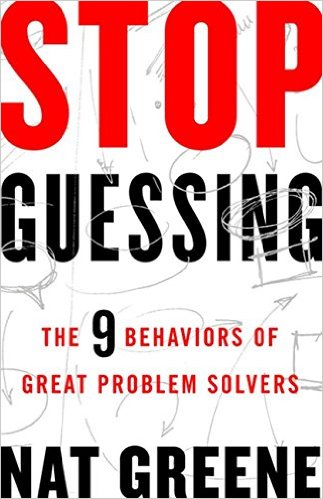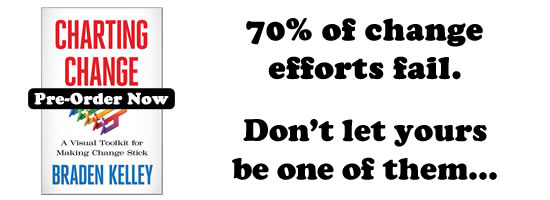The 9 Key Behaviors of Top Problem Solvers
 The great problem solvers of the world are no smarter than anyone else. What sets them apart are the behaviors they use on the hunt for solutions. We’ve all had times when something’s broken and we can’t seem to fix it. Instead we often create complicated workarounds, or just live with the dysfunction.Â
The great problem solvers of the world are no smarter than anyone else. What sets them apart are the behaviors they use on the hunt for solutions. We’ve all had times when something’s broken and we can’t seem to fix it. Instead we often create complicated workarounds, or just live with the dysfunction.Â
Â
Both approaches are not genuine solutions. At best, they’re compromises — and they may cause further problems down the road. But we can do better — if we just follow the same simple and effective behaviors that great problem solvers use. If you want to get better at solving a problem, learn from those who do it well.
Â
Here are the 9 behaviors great problem-solvers use to solve hard problems with skill and panache:
Â
1. Stop guessing. Stop taking stabs in the dark and just trying things out. After a few ineffective guesses at a hard problem, you’ll realize it’s time to try something new. But if you don’t have a way to work out a solution, chances are you’ll fall back on your old habits and the problem will go unsolved. That’s where the other eight behaviors come in. They will help you to address the problem effectively instead.Â
Â
2. Smell the problem. Step away from your desk and get into the field. Use your natural senses and the tools at your disposal to assess where the failure started and the pattern it took. Don’t bury yourself in reams of data. Ask relevant questions about that specific problem. This behavior may solve some moderately difficult problems right away. For harder challenges, it’s a critical step towards a solution.
Â
3. Embrace your ignorance. Most people try to solve problems using the knowledge they already have. But it’s what you don’t know that matters, not what you do. Great problem-solvers embrace their ignorance. Instead of trying to protect their reputation as an expert, they ask questions others might find “stupid.†The behavior shatters old assumptions you have about the problem, so you can look at it with fresh eyes.
Â
4. Know what problem you’re solving. Often, people work on the wrong problem entirely by making some implicit assumption about what’s causing it. But if you don’t know what the problem really is, you can’t fix it. Great problem-solvers take the time to define the problem in an accurate, precise way. Instead of jumping to conclusions, they take careful measurements. They invest the time to observe it so they know exactly what’s wrong.Â
Â
5. Dig into the fundamentals. Learn how the process works, including the basic science behind it. Focusing on what controls your problem enables you to limit your digging to the parts of the process and the science that are relevant. It’s much easier to focus that way than try wrapping your arms around the entire thing at once.Â
Â
6. Don’t rely on experts. Too often, people delegate problem solving to outside experts. While experts are critical to understanding a complex system and its underlying functionality and science, they may not be as well positioned to solve the problem for you. The best problem-solvers always view experts as collaborators rather than saviors, and drive the search for solutions themselves. Â
Â
7. Believe in a simple solution. It might be comforting to believe the solution to a complex problem will be just as complex. Thinking “it’s just really complicated†makes it easier to give up before going through the necessary rigor. But great problem-solvers are tenacious. They won’t stop until they’ve gotten to the root of the problem — and that’s where the easiest, most economical solution will emerge.
Â
8. Make fact-based decisions. Making a decision that’s based on opinion, a vote, an authority, or any other subjective system isn’t actually solving a problem. Great problem-solvers insist on using only the facts to make a decision about a problem. They also relentlessly verify what they are told, and check data streams to ensure that what they’re seeing represents reality.Â
Â
9. Stay on target. When we deep-dive into a problem, we frequently seek to find as many potential causes as possible, so we can test them all. But this approach can waste time and resources. It’s also unlikely that the true root cause is among those hundreds or thousands of potential causes. Great problem-solvers measure the drivers that most immediately control the problem, and then rule out as many variables as they can. This keeps them efficiently on-track and focused.Â
Â
Great problem solvers avoid guesswork, taking a structured approach that reveals how the failure happened. By applying these 9 behaviors, they get a lucid picture of the problem, and stay targeted on an effective solution. And that takes care of another problem we all have: getting better at solving problems in the first place. Whether you’re tackling a production snafu, a crisis at home or any other challenge, these are 9 behaviors that work.
Â

Wait! Before you go…
Choose how you want the latest innovation content delivered to you:
- Daily — RSS Feed — Email — Twitter — Facebook — Linkedin Today
- Weekly — Email Newsletter — Free Magazine — Linkedin Group
Â
 Nat Greene is the co-founder and current CEO of Stroud International, and author of Stop Guessing: The 9 Behaviors of Great Problem-Solvers. Nat has a Masters of Engineering from Oxford University and studied design, manufacturing and management at Cambridge University, in addition to executive education coursework in Harvard Business School’s Owner/President Management program.Â
Nat Greene is the co-founder and current CEO of Stroud International, and author of Stop Guessing: The 9 Behaviors of Great Problem-Solvers. Nat has a Masters of Engineering from Oxford University and studied design, manufacturing and management at Cambridge University, in addition to executive education coursework in Harvard Business School’s Owner/President Management program.Â
NEVER MISS ANOTHER NEWSLETTER!
LATEST BLOGS
Followup – Motoring Innovation
I came across an interesting article today on stackable cars that is a good followup to my article about vehicle…
Read MoreProjecting the Future
I’ve been hearing for a while now about the big bulb projector being on its way out soon, which will…
Read More


